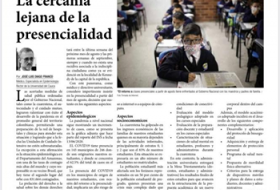News
The distant closeness of face-to-face
We share the article by the rector of the University of Cauca published on Sunday June 14 in the newspaper El Nuevo Liberal related to the face-to-face issue.
The successful public health measures ordered by the National Government, such as quarantine, self-care and mutual care, managed to successfully slow down the development of the pandemic in the general average of the Colombian territory, allowing a preparation of the network of hospitals and clinics to address this situation and ensuring that the Intensive Care Units are not oversaturated to date. The exception to this statement is the epidemiological situation in the Department of Amazonas, with one of the highest contagion rates in the world, and which is responsible for its neighbor Brazil, which today has second place in the world with 831,664 infected.
The priority of the right to health over other rights affects the economy in general, both in the GDP and in aspects related to the business level, the promotion of employment, unemployment, among others that are creating effects on mental health with the social isolation related to quarantine and unemployment, among which are gender or family violence, mistrust, feelings of desolation and hopelessness.
The pandemic has not yet reached its peak and analysts predict that this expected event will occur between the last week of next August and the first weeks of September, as long as there is no recurrence associated with citizen indiscipline as already evidenced in the Kennedy locality of the capital of the republic.
With this panorama, as a doctor and university director, I consider it impertinent to insist on the attendance from the month of August, a decision that I support in the following aspects:
EPIDEMIOLOGICAL ASPECTS
The pandemic at the national level continues to show an increase in cases, as presented in the attached graph that is part of the INS report as of 06/13/2020.
EL COVID19 has a presence in 143 municipalities out of 246 where our students originate, and where 62.5% of the total cases in the country are concentrated.
The presence of COVID19 in the municipalities of origin of our students, on the occasion of the return to face-to-face, would imply a high risk of generating new contagion chains and could generate a new outbreak gestated on our university campus, which would lead to legal difficulties.
The mental health generated from the situation of social isolation and the integration of the use of new technological tools to the current dynamics, either in the form of work at home or the completion of non-contact courses, is creating tensions in behavior due to ignorance in the use of technologies, due to the lack of access to the internet or computer equipment.
SOCIOECONOMIC ASPECTS
The quarantine has hit the economic income of the families of our students who mostly depend on informal activities, mainly from strata 0, 1 and 2, which are 83% of our students. This situation would be expressed in a high number of non-enrolled students.
The most affected student population is foreigners, represented by 56 percent of the undergraduate student population, who have a more complex crisis, since in addition to paying tuition, living expenses are added.
By discarding, and as the only alternative to guarantee the continuity of academic activities for the second semester of this year, virtuality is consolidated. This situation forces us as a university administration to develop previous studies that allow the characterization of related variables, among which I mention:
Characterization of connectivity conditions
Evaluation of the pedagogical model adopted in the special courses
Assessment of teacher and student preparation in special courses
Characterization of mental health situations in students, teachers and administrators during quarantine
In this context, the university administration will deliver the final results of these studies to the Tristamentary Table (teachers, students and administrative staff) so that they can advance in structuring the academic proposal of a new dual model (face-to-face and virtuality), which includes the following themes:
Curricular proposal by subjects
Pedagogical models
Academic and administrative adjustments related to the application of body distancing within the campus
Furthermore, the academic model adopted will influence the development of the following complementary components:
Development and application of the biosafety protocol
Acquisition and delivery of personal protection items
Mental health program
Alternative physical mobility proposal
Criteria for the delivery of mobile devices and data plans to students, teachers and administrators
Contingency plan against a recurrence of the pandemic
The following weeks will be of intense work with the Tripartite Table, in which a new planning route will be proposed that we will initially support, providing the required information.
More Info:
Rectory
Email: rectoria@unicauca.edu.co


